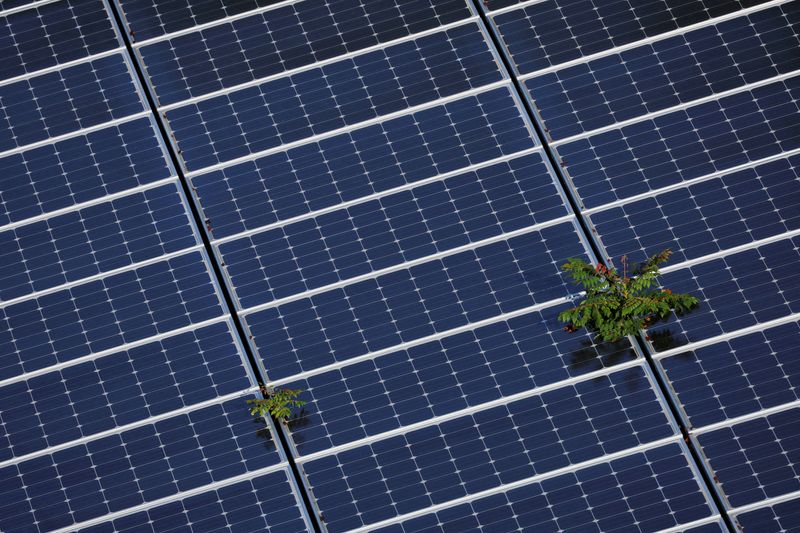By Nichola Groom
(Reuters) - The White House on Thursday said it would protect domestic solar factories from Chinese competition by scrapping a tariff exemption for imported double-sided panels and making it easier for projects to claim a subsidy for using American-made products.
The moves come as President Joe Biden touts his economic policies ahead of a November election against his predecessor, former President Donald Trump. As part of the fight against climate change, Biden has sought to expand investment in the manufacturing of clean energy products, aiming to reduce the nation's reliance on Chinese-made goods.
The White House said it would soon remove a two-year-old trade exemption that has allowed imports of so-called bifacial panels to avoid duties. Those panels were a small part of the market at the time of the exemption but are now the main technology used in utility-scale solar projects.
Reuters first reported the administration's plans to do so last month.
Biden will also end a waiver on tariffs imposed on solar panels made by Chinese companies in Malaysia, Cambodia, Thailand and Vietnam. He imposed the temporary waiver two years ago at the request of U.S. project developers who rely on cheap imports to make their facilities cost-competitive. Since then, however, the White House said U.S. manufacturing has expanded and those producers face competition from a surge in Chinese solar factory capacity that has depressed prices.
"These actions will provide a boost to domestic solar producers, but the impact of Chinese oversupply on U.S. investments in the solar market remains a challenging issue," John Podesta, Biden's senior adviser for international climate policy, said on a call with reporters.
Biden's Treasury Department also issued new rules on how clean energy project developers can qualify for a tax credit meant to incentivize the use of U.S. equipment.
The 10% domestic content bonus is in addition to a 30% credit for renewable energy facilities included in Biden's landmark climate change law, the Inflation Reduction Act.
Treasury first unveiled guidelines for claiming the bonus credit a year ago, but project developers complained that the complex rules made it difficult to use.
To qualify, the IRA specifies that 40% of the cost of a project's so-called manufactured products must be made in the United States. Those products could include solar panels, inverters, or battery packs. But determining the cost of labor and materials for products built with components from multiple suppliers - often in different parts of the world - proved challenging.
Under the new rules, Treasury will allow project developers to use default cost percentages determined by the Department of Energy to qualify for the credit.

Treasury said it was still considering additional rules that would help offshore wind developers qualify for the domestic content bonus. It is also evaluating ways to incentivize manufacturing of solar wafers, the building blocks for solar cells.
Qcells, a division of Korea's Hanwha Corp that is investing $2.5 billion in U.S. solar factories, said the Biden administration's measures were "critical to creating tens of thousands of jobs in America."